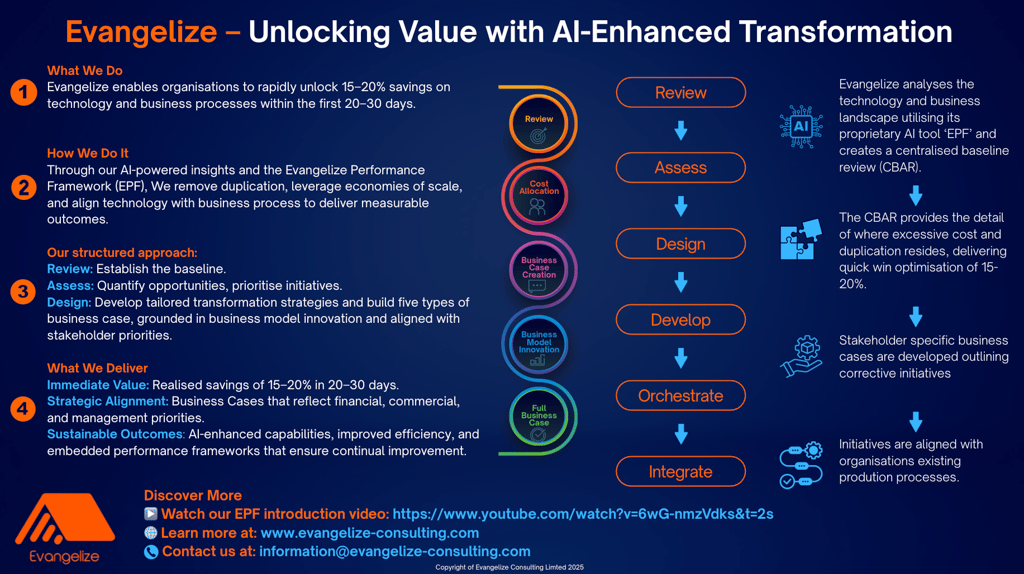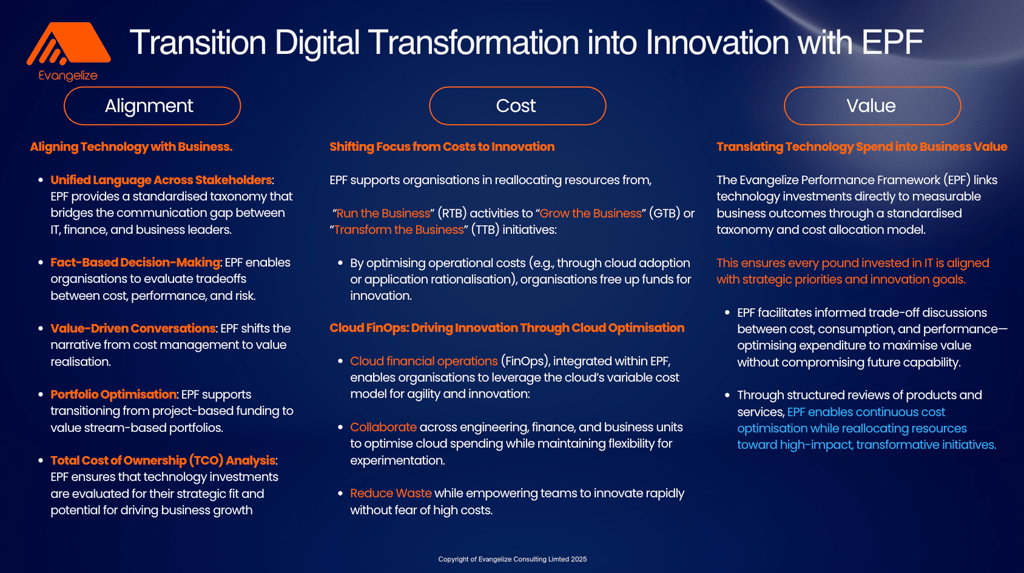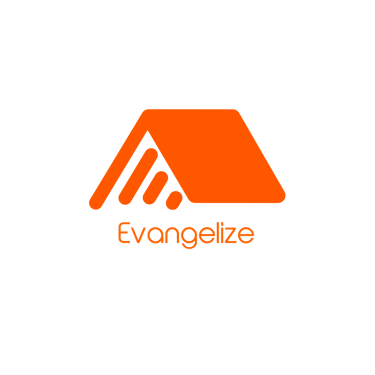
The Evangelize Performance Framework
AI-powered outcomes that turn cost centres into profit drivers
By applying evidence-driven cost transparency, predictive insights, and scenario-based design, we deliver tailored transformation strategies that streamline operations, drive measurable efficiency, and unlock sustainable business value.



Comprehensive Full Stack Assessment, providing a 360-degree evaluation of your organisation’s infrastructure, software, processes, and people.
Capture Duplication and Cost Inefficiencies.
Identify Poor Resource Utilisation in workflows, systems, and processes.
Highlight opportunities for optimisation and innovation.
--------------
--------------
--------------
Diagnostic & Opportunity Analysis Report (DOAR)
Heatmap of value leakage, quantified savings, and a risk-weighted pipeline via the EPF engine.
Cost Transparency Scorecard
Spend by service, vendor and unit cost benchmarks for Strategic Executive Decision making.
Strategic Sustainability
Track Business Benefits, Duplication and Vendor Sprawl
Every aspect of your business and technology landscape is analysed, optimised, and transformed to deliver maximum value.
It is so much more than just a financial tool — it is a powerful driver of operational excellence.
Watch: How EPF Delivers 10-22% Savings in 30 Days
Integrate financial data with performance metrics to expose the fundamental drivers behind every pound spent.
Break down operations into measurable components that reveal not just what you're spending, but also what value you're achieving.
Enable swift identification of inefficiencies and Intelligent Resource Allocation, embedding cost intelligence directly into your operational DNA.
The Challenge
Most organisations struggle to turn strategic ambition into real results. Hidden inefficiencies drain budgets, fragmented change programmes miss targets, and traditional approaches fail to realise the full value of transformation.
Costs remain hidden, benefits go untracked, and momentum stalls.
Our Solution: The EPF
Evangelize Consulting bridges strategy and execution with
our AI-enabled Evangelize Performance Framework (EPF):
Uncover hidden value with advanced analytics and AI insights
Build evidence-based business cases using the Five Case Model
Deliver cost transparency and operational efficiency with TBM
Embed sustainable performance through ITIL 4 alignment
We don’t just plan transformation — we make it deliver.
Proven Outcomes
The Evangelize Performance Framework (EPF) is a five-stage approach that delivers cost savings and strategic clarity.
10–22% cost savings within the first transformation cycle
Full transparency of technology and operational costs
Accelerated benefit realisation and reduced risk of programme failure
Enduring performance improvements powered by AI-driven insights and predictive scenario modelling
“Evangelize gave us the clarity and confidence to make decisions we’d been delaying for years. The results were immediate and measurable.”
— Alicia Johnson, CFO, Zwish Financial Services
Why Evangelize?
The Evangelize Performance Framework (EPF) is a five-stage approach that delivers cost savings and strategic clarity.
Independent & Vendor-Agnostic: We work for your outcomes, not for your suppliers.
Executive-Focused: Tailored value for CFOs, CIOs, and business leaders.
Data-Driven, Business-Led: Strategic recommendations backed by financial and operational analysis.
Deep Expertise: TBM-certified practitioners, AI-led insight, and real transformation experience.
Using Business Model Innovation within the Evangelize Performance Framework allows companies to not only adapt their current business models for greater efficiency but also to create entirely new models that reflect evolving consumer expectations and technological advancements.
This combination results in enhanced operational resilience, scalability, and long-term sustainable growth—all core to the Evangelize framework’s principles.


Cost - Structure - Value
Evangelize Consulting:
Where AI-driven insights deliver transformation that pays for itself
